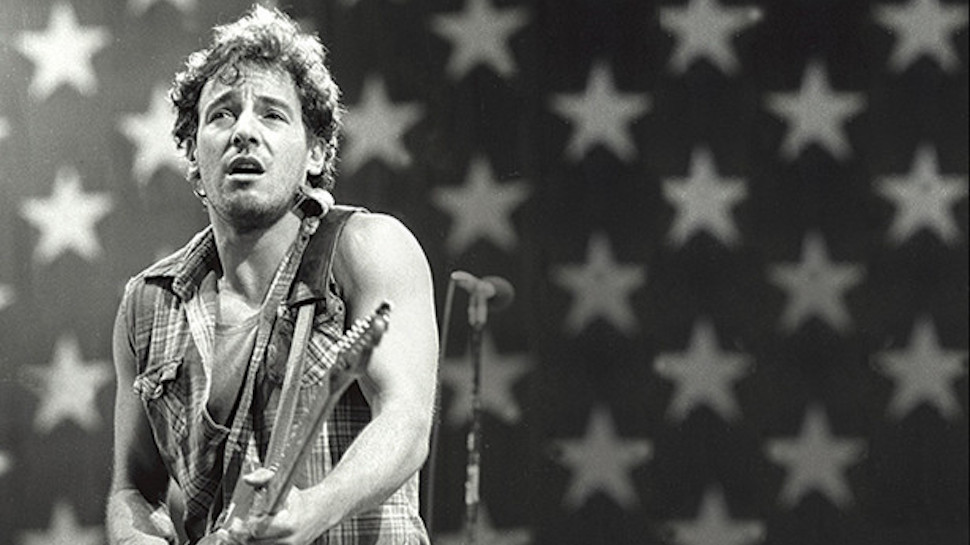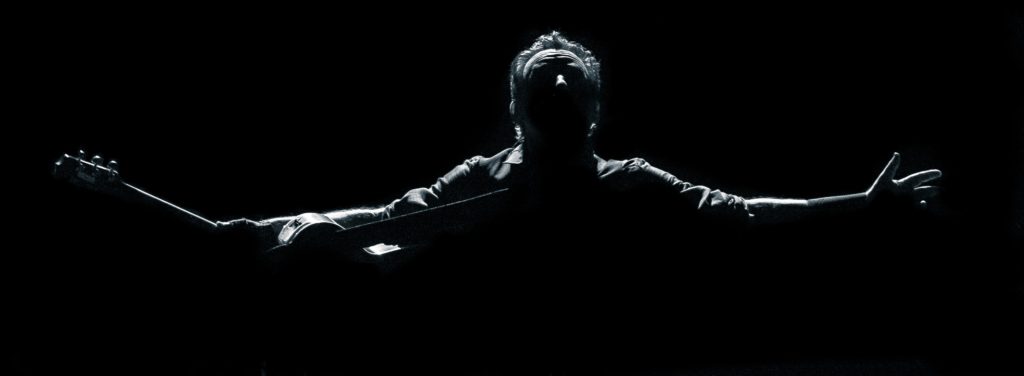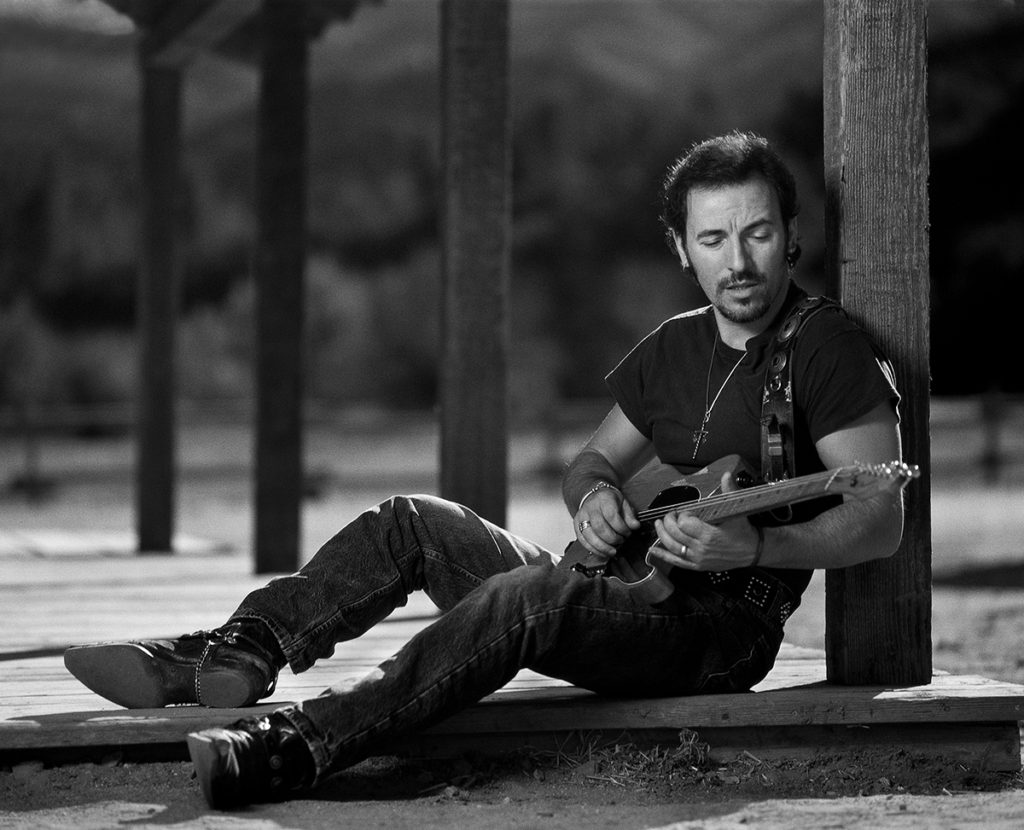Now those memories come back to haunt me
they haunt me like a curse
Is a dream a lie if it don’t come true
Or is it something worse
that sends me down to the river
though I know the river is dry
That sends me down to the river tonight
– Bruce Springsteen, “The River”
My first memory of hearing Bruce Springsteen’s music occurred on a late summer evening; darkness reigned outside the window in the back seat. Nearby city lights illuminated my view from I-93. I was along for the ride, in this strange car, not in the mood to act up, probably oblivious to where we were going. I sat transfixed, in a temporary caretakers car, focused on the lights and listening to the words that were making me feel things I couldn’t quite identify: “Born in the U.S.A! I was born in the USA!” I felt the hook, even at six, though I had no idea what it was or who was singing it. I just thought the singer was screaming the term U.S.A over and over again. U.S.A.! I thought, Yeah, I’m here too! I was born in the U.S.A. I took it literally. I felt myself in a situation that I didn’t belong, and I was lonely in it (not unlike the small town criminal in the song); and at the very least, I could identify with it on a regional level.

So I sat there. The song sounded freeing, and hollow all at once. The next thing I remember is the car pulling over so the older boy next to me could take a leak on the side of the road. I averted my eyes, but didn’t know why exactly. I felt invisible. These are the feelings I remember when I was being introduced to Springsteen’s “Born in the U.S.A.” balmy summer air, shorts, my feet not touching the floor of the car, dots of lights outside, stopped at the side of the road, the feeling of impatient waiting (my grandparents would win custody soon and the waiting would be over), and this kid suddenly peeing and laughing, grinning with crooked aim, while his father’s chuckles egged him on. Suffice to say, this song mixed with this particular experience has made an impression on my psyche.
I was never a Bruce fan as an older listener. I could stand some songs, but the anthem-like quality to “Born in the U.S.A” and the fact that I had no depth of understanding of the lyrics and what they truly meant (Vietnam/PTSD), sort of painted a bland picture of what it was I was listening to and who his music was intended for. I also was not yet an amateur guitarist, which would open up a world of new tastes and appreciations for styles that I normally would have flubbed off. As someone who is obsessed with music of old and new, and somewhat aware of obscure genres and bands, I felt his music was sort of, eh. It didn’t fit with what I was into. If his songs came on the radio I wouldn’t cringe, but I felt nothing. I felt Bruce was always portrayed as an icon exclusively meant for a blue-collar, proud flag-waving audience of listeners. That was an immediate turn-off in my mind, but that is also presumptuous and untrue. I wasn’t sure how I fit into his demographic as a listener, and I would find myself shrugging him off as an artist, so I didn’t go there.
Bruce’s music is for everyone. Yes, the theme of man’s American struggle may directly cater to some listeners compared to others: male, conservative, working-class folks, but let’s not do a disservice to Bruce’s musicianship by focusing on audience alone. It’s unfortunate that liberal-minded millennials who, assuming his brand is too blue-collar and alienating to them, shudder at the thought of listening at all. This seems a self-cultivated indifference to certain bands based on an individual’s musical ignorance and/or assumptions based on popularity and the artists perceived uniqueness. I know this is a fact because I have pretty particular interests myself, but I can say that if something has soul and is lyrically sound and tells an amazing story, whether or not its aimed at “the masses,” it’s going to be worthwhile on some level. Not that I need to be pronouncing Bruce Springsteen as worthy or anything. So, if younger, self-proclaimed (insecure) hipsters grasp Bruce as a musician in these polarizing ways, they are making a mistake. Maybe this is obvious to most die-hard Bruce fans, but it wasn’t always obvious to me. I admit this flaw, and can only grow to appreciate this point going forward.
I remember the day a stranger (that’s right!) offered me a free ticket to a Bruce Springsteen concert and planted the seed of appreciation. I was at work in my old library and a patron just offered it up because she couldn’t make it. I had no idea how much this ticket cost, and I had not yet taken any ethics test through this town, and so, I wasn’t faced with any moral dilemmas at the time. It was a free concert ticket, and I wasn’t going to let it go to waste, so… I went.

At this point in my existence, I was (yet again) like a loner in a Springsteen song, a little lost and vulnerable. I had struggled to find steady employment, and felt generally unfulfilled, unloved, and bored. I wasn’t feeling as cranky as I normally would have regarding venue, and I wanted to do something new by myself. I took the free ticket this dear woman had practically planted in my hand, and went to see The Boss alone. In case anyone is wondering, Bruce is definitely worth more than this. I learned that as soon as I took my seat at Fenway.
Everyone was amped up. The first wave of excitement hit me when I watched him on one of the several huge hanging screens. It showed him making his way out from backstage. Eventually, he came running out in his signature vest, long-sleeves rolled and singing a song I couldn’t identify. In between songs, someone held up a hotdog and a beer; he accepted the offerings and taking a jolly bite and possibly a gulp ( or vice versa), shared his love for Bostonians, and jumped back into his song. More screaming ensued. Baby-boomer women swayed against their overjoyed, bearded husbands, who were hugging their wives from behind like they were high-school sweethearts. Bruce was now belting out “Sherry Darling.” An energetic Bruce danced around the stage, quite agile; how old was he, I thought? He became more energized by the hour, it seemed. Years since my first impression of this guy had formed, I stood alone now, at thirty-three, staring again into otherworldliness; similarly stunned as I when I was a kid listening to his music. I recognized my six-year-old self in that stadium, looking out at people and lights, like the stars that were my companions years earlier. All of my senses again were engaged in this moment with Bruce. He was the real deal, and he LOVED every minute of this. There was no confusion about that; and while I left knowing he was an amazing performer, I still wasn’t convinced I was a true fan. What did I know about it? So I kept listening.

I would spend the next two years reminiscing about how Bruce was a natural entertainer. He was the real deal on stage, sure, but it wasn’t until I discovered something I never knew (or gave too much thought to) about Bruce: he had an acoustic side and he was a gifted songwriter (I know, duh). I came across his sixth studio album, Nebraska (1982), on Spotify. My husband is a big fan of The River (1980) specifically the title track “The River ” which is also one of my favorite songs on the album nowadays. “The River” is a sad song, but its depth lies in its truthful depiction of young love and losing love. Nebraska reveals a similar spareness, as it is Bruce, his guitar and occasionally his harmonica. It is raw and lonely, depicting a loner struggling in his desperation to: escape, provide, love, and live. It is one of the deepest albums I have ever listened to, and one that is so relevant to me, despite my not being a working-class white man who has had these experiences. The raw humanity and the conversational and confessional quality of the lyrics are heartbreaking to experience.
The songs on this album are basically stories based on real lives in turmoil, which most listeners can relate to, even if we aren’t carbon copies of one another as humans, we can feel the pain. The lyrics remind me of studying Naturalism in American Literature. There is almost a tragic self-fulfilling prophecy in the lives of the men and women in them, and usually, a central solitary character who can’t seem to get ahead in life. The odds are stacked against him. On Nebraska, at times, he howls like a lone wolf; at other times he seems to show respect to authority with “sir,” which shows his class in the world he lives. The concept of a man against the world unfolds in each song, and (and much of his music) is said to be inspired by his father and the struggles he endured. Bruce captures it brilliantly on this album. Interestingly, there was a film made based on Highway Patrolman called The Indian Runner, directed by Sean Penn. I have yet to see it, but the adaptation to film makes perfect sense: a dreary open landscape, a strong plot and real people struggling to maintain a sense of self and integrity in their complex world.

Nebraska – Bruce Springsteen
Three albums: The River, The Ghost of Tom Joad, and Nebraska had changed my perception of Bruce as a musician. I love Patti Smith, and I am always excited to share with whoever who will listen that they had collaborated in writing the hit, “Because the Night“.
The Promise: The making of the Darkness on the Edge of Town is an incredible documentary to bear witness to Bruce’s perfectionism and detail-oriented composition as a songwriter. If you aren’t convinced he is committed as a lyricist or musician, watch that documentary!
Bruce’s gravelly baritone is evocative and filled with longing on Atlantic City, regretful and melancholiac on The River, and full of regret and pain on Highway Patrolman ( dibs on writing this flick soon too!). Wherever you are in this crazy U.S. of A., Bruce’s words may ring true for you too.
“I’m just a scared, lonely rider
Will you walk with me out on the wire
`Cause baby I’m just a scared and lonely rider
But I gotta know how it feels
I want to know if love is wild
Babe I want to know if love is real
-Bruce Springsteen
